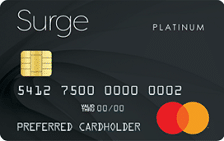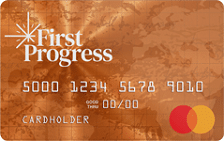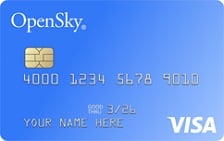Filter Options
×-
-
Unselect all
-
Unselect all
-
Unselect all

Showing 119 Cards
Sort By Column Name:
NerdUp by NerdWallet Credit Card
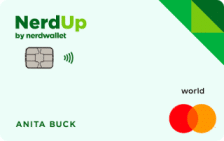
NerdUp by NerdWallet Credit Card
- 0% Cash Advance APR
At a Glance
The NerdUp by NerdWallet is a secured charge card designed to help build credit. The card earns 1% cash back on purchases, features a fairly low security deposit requirement, but doesn't provide any route for graduation to unsecured credit.
- Best Benefits
- Rates & Fees
- Why Should You Apply?
- Build your credit with no credit check or interest charges
- Earn 1% cash back on purchases
- Use rewards to increase your deposit or offset your card bill
- $0 annual fee
- Cash Advance APR: 0%
- Cash Advance Transaction Fee: $3 per ATM withdrawal
- Late Payment Penalty Fee: $5
- Return Payment Penalty Fee: $5
- Minimum Deposit Required: $100
- You are new to credit and want an easy way to begin building credit
- You want automatic repayments to help avoid missed payments
- You want basic cash back rewards without an annual fee
Current Build Card
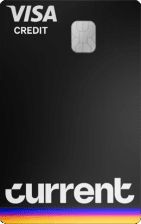
Current Build Card
- 0.00% Regular Purchase APR
- 0.00% Cash Advance APR
At a Glance
The Current Build Card is a no annual fee secured card that builds credit while earning up to 7X points and 4% APY on savings. The card features no account minimums, no overdraft fee, and spending insights to help your build credit.
- Best Benefits
- Rates & Fees
- Why Should You Apply?
- Build credit with no minimum deposits and no annual fee
- Up to 4% APY on savings
- Earn up to 7X points on purchases with over 14,000 merchants
- No overdraft fee
- Regular Purchase APR: 0.00%
- Cash Advance APR: 0.00%
- Annual Fee: $0.00
- Foreign Transaction Fee: 3% of the transaction amount in U.S. dollars
- Late Payment Penalty Fee: 3% of any Total Due balances outstanding and past due for two or more billing cycles
- You are new to credit and want an easy way to begin building credit
- You plan on utilizing Current's spending insights to help you save money
- You don't want to pay an annual fee to earn rewards
Taz Visa®
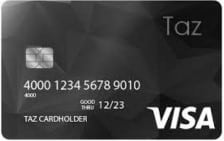
Taz Visa®
- 29.99% variable based on the Prime Rate Regular Purchase APR
- 29.99% variable based on the Prime Rate Cash Advance APR
At a Glance
The Taz Visa® is a credit builder credit card that offers a platform for responsible use but little else. The card, from First National Bank, continuously monitors for credit limit increases, giving you the tools you need to demonstrate a positive credit history and graduate to more impressive rewards cards in the future.
- Best Benefits
- Rates & Fees
- Why Should You Apply?
- Stay on top of your account with the Taz mobile app
- U.S. based customer service
- 24/7 zero liability fraud protection
- Taz regularly monitors for credit limit increases
- Regular Purchase APR: 29.99% variable based on the Prime Rate
- Cash Advance APR: 29.99% variable based on the Prime Rate
- Cash Advance Transaction Fee: 2% of the amount of each cash advance
- Annual Fee: See Terms
- Late Payment Penalty Fee: Up to $7.50
- Return Payment Penalty Fee: Up to $25
- You have bad credit and want to repair it with responsible use
- You can afford the steep annual fee
- You don’t plan on using the card to carry a balance
- You have a mail offer from Taz
Total Select
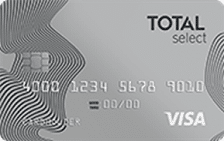
Total Select
- 29.99%, compounded daily Regular Purchase APR
- 29.99% Cash Advance APR
At a Glance
The Total Select Card is designed for those with less-than-perfect credit who want a convenient payment card without a high barrier of entry. Ideal for building or rebuilding credit, this offer can give you the boost you need to level up your credit standing.
- Best Benefits
- Rates & Fees
- Why Should You Apply?
- Total Select cardholders get FREE access to Credit Monitoring powered by TransUnion. Enroll Today!
- $300 Credit limit
- Chip-enabled card for added security
- Credit limit increase possible after 12 months
- Reports monthly to major credit bureaus
- Quick and easy approval process
- Regular Purchase APR: 29.99%, compounded daily
- Cash Advance APR: 29.99%
- Cash Advance Transaction Fee: $10 or 3% of the amount of each cash advance, whichever is greater
- Annual Fee: $75 the first year ($48 after that)
- Late Payment Penalty Fee: Up to $41
- Return Payment Penalty Fee: Up to $41
- You're want to build or rebuild your credit and are looking for a Visa card that doesn't require perfect history
- You prefer a credit card that doesn't charge a program fee or require a security deposit
- You want convenience to manage your account via the card issuer's own mobile app
- You want a card that works extra and reports your payment history to the three major credit bureaus and also provides free credit monitoring tools
Zolve Credit Card
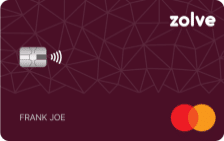
Zolve Credit Card
- 16% variable based on the Prime Rate Regular Purchase APR
At a Glance
The Zolve Credit Card is a credit builder credit card that helps new arrivals to the U.S. build credit and move on to more impressive rewards from the same program. The Zolve credit card earns unlimited 1% cash back and offers additional benefits with no annual fee.
- Best Benefits
- Rates & Fees
- Why Should You Apply?
- Up to $5,000 credit limit
- Earn 1% unlimited cash back
- Earn up to 10% cash-back at over 10,000 shopping outlets
- Regular Purchase APR: 16% variable based on the Prime Rate
- Late Payment Penalty Fee: Up to $40
- Return Payment Penalty Fee: Up to $40
- You are a new arrival to the United States and want to begin building credit
- You prefer a card program that grows with you - not one you grow out of
- You are happy with basic rewards and plan to stick with the free option
You've viewed 5 of 119 credit cards
What is a Bad Credit Score?
According to statistics from Experian, one of the major credit bureaus, 16% of Americans suffer from a bad credit score. Bad credit causes serious financial harm, making it tough to get a mortgage, car loan, or the best credit cards.
But what is bad credit, and what causes it?
Bad credit refers to a low credit score resulting from a history of missed payments, late payments, bankruptcy, or other negative financial events. A bad or deep-subprime credit score may also indicate a limited credit history. This credit rating indicates to lenders that you may be a higher-risk borrower, which could lead to difficulty obtaining credit at favorable terms, such as loans, mortgages, or credit cards.
On the FICO Score scale, a bad credit score falls within the range of 300 to 579, while on the VantageScore scale, it ranges from 300 to 499.
How Can Bad Credit Impact Your Life?
Here are some ways bad credit can cause problems in your everyday life.
Renting an Apartment
One of the biggest impacts of a bad credit score is the difficulty in finding an apartment to rent. Renting a home or apartment typically involves a credit check, which helps landlords assess the risk posed by potential tenants. A bad credit score, including a history of late payments, can prevent you from securing a new place to live.
Insurance and Bills
Bad credit also makes it more challenging to pay bills and obtain insurance. Utility companies may be hesitant to accept you as a customer if you have a poor credit score, often requiring a deposit before providing services such as electricity, gas, or water.
Similarly, insurance companies consider your credit when determining your insurance premiums. Bad credit is associated with higher insurance costs, particularly with auto insurance, as insurers believe individuals with lower credit scores are more likely to file claims.
Employment
Statistics show up to 70% of employers conduct credit checks during hiring. Companies use these checks to evaluate potential hires’ responsibility levels. While bad credit doesn’t necessarily indicate unreliability, employers may view it as a red flag and choose another candidate instead.
Relationships
A bad credit score can indirectly create problems in your personal life. The inability to secure a mortgage, rent an apartment, or obtain a car loan can strain family and personal relationships. Constant calls from bill collectors or collection agencies can also cause issues at home.
What Causes Bad Credit?
Bad credit can result from any number of situations and circumstances. The most common cause of a poor credit score is a history of late or missed payments, which reflects poorly on your creditworthiness. Another cause is excessive debt, where your credit utilization ratio is high, indicating that you have borrowed a significant portion of your available credit. Additionally, bankruptcy, foreclosure, and collections can all contribute to bad credit. Understanding these factors is essential so you can effectively address them.
How to Improve Your Credit
Bad credit has serious ramifications in everyday life. Fortunately, there is something you can do – here are some of our top tips for improving your credit score:
| ① Check your credit score | The first thing you should do is check your credit score to see where you stand. You might already know your credit score is bad, but how far down on the scale, does it go? Knowing how fast you can improve your credit from “bad” to “fair” is crucial to making a financial plan of attack. |
| ② Get a credit card for subprime credit | Part of boosting your credit score is increasing your use of credit. For those with bad credit, this may seem counter-intuitive. Fortunately, there are many unsecured credit cards for poor credit and secured cards that can help you repair your credit score. |
| ③ Pay on time each month | As seen in the scoring models, payment history is the biggest factor in your credit score. Because payment history is so important, paying your credit card bill on time each month is essential to boosting sub-prime credit. Missed payments stay on a credit report for seven years. |
| ④ Keep your credit use low | Credit utilization is as important as paying on time. Credit utilization shows lenders how you use your credit. Those who keep their credit use below 30% can expect their score to improve, while those who use less than 10% can expect a much faster score rise. |
Tips for Managing and Paying Off Debt
Managing and paying off debt is crucial for improving your financial health. Start by creating a realistic budget that allocates funds toward debt repayment. To tackle your debts effectively, consider the snowball or avalanche method.
- Snowball method: Pay off your smallest debt first and then move on to the next, creating a sense of accomplishment and motivation.
- Avalanche method: Prioritize debts with the highest interest rates to save money on interest payments.
Whichever method you choose, allocate as much money as possible towards monthly debt repayment.
Credit Counseling and Debt Consolidation Options
If you find yourself overwhelmed by debt and unable to make progress independently, consider seeking professional help. Credit counseling agencies can provide guidance and support in managing your finances and developing a plan to pay off your debts. They can also negotiate with creditors on your behalf to establish new repayment terms.
Debt consolidation is another option worth exploring. This involves combining multiple debts into one loan or credit card with a lower interest rate, making it easier to manage your payments and save money.
Conclusion
Bad credit can be challenging, but with the right knowledge and strategies, you can rebuild your credit and move towards a brighter financial future. Understanding the causes of bad credit, checking your credit score and report regularly, and implementing practical steps to improve your credit will set you on the path to financial success. Remember, it takes time and discipline, but the effort is worth it.
Check out more
Sub-Prime & Secured Credit Cards
Editorial Disclosure – The opinions expressed on BestCards.com's reviews, articles, and all other content on or relating to the website are solely those of the content’s author(s). These opinions do not reflect those of any card issuer or financial institution, and editorial content on our site has not been reviewed or approved by these entities unless noted otherwise. Further, BestCards.com lists credit card offers that are frequently updated with information believed to be accurate to the best of our team's knowledge. However, please review the information provided directly by the credit card issuer or related financial institution for full details.

